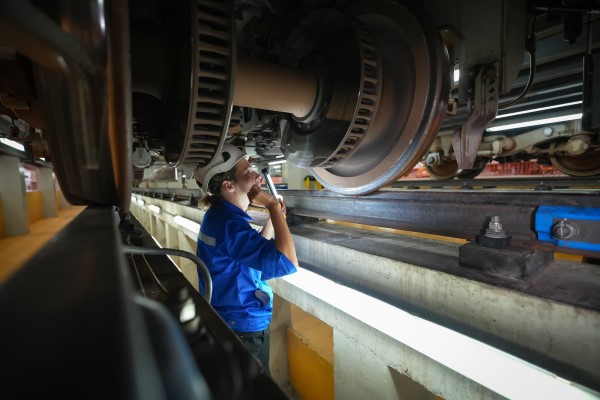Do you work in the railway supply chain? Raising a health and safety concern confidentially can take a load off your mind.

If you work on the railway frontline, you can raise your health, safety and wellbeing concerns confidentially through CIRAS confidential safety hotline. Your employer will then know what is worrying you, but without them knowing your identity, and you will get a response.
Once we know about your concern and we have passed it on, we share your employer's response with you and can ask further questions on your behalf. You can also tell us safety concerns you have for another company, that isn't your employer, such as if you're a contractor on another work site and have concerns about the practices there.
Unsafe practices
Here is a real-life example of how it works. Someone contacted CIRAS because they were concerned that staff on-site were misusing machinery, handling materials incorrectly and disregarding speed restrictions. They were worried that this could lead to operational incidents or injuries. Using CIRAS, they asked the company to investigate the site, enforce speed restrictions and make sure people were using the right tools for the task and handling materials the right way.
The company began by carrying out an investigation. It shared the findings, through CIRAS, with the person who raised the concern. The company then decided to remind the operatives on site about safe manual-handling techniques. It reaffirmed that its own employees should be checking that contractors had been trained and assessed appropriately, and emphasised its expectations about this to the relevant companies.
The company also committed to a new awareness week with a focus on hazards, as well as highlighting and sharing information about its project to help review vehicle speeds.
Safety first
You might be reluctant to tell your company what you are concerned about. Maybe you feel embarrassed about a mistake, you are not sure if something should be concerning or you just want to get on with the job, no more questions asked. But raising awareness of health and safety issues will make your workplace safer. That is whether you tell your manager directly, use your company's reporting channels or use CIRAS.
We do not take reports of real-time incidents because we could not guarantee a response in time for a safe outcome. But examples of what you can report to CIRAS include fatigue, inappropriate equipment that could lead to health and safety issues, environmental and health concerns such as poor air quality and silica dust, problematic procedures and processes, and not having proper training. There are many possibilities.
Raising concerns gives companies the information that they need to improve working practices or the working environment. As well as reducing the risk of long-term, work-related health problems, it can help prevent hazards or smaller incidents from developing into something bigger and more harmful.
Confidentiality matters
Because CIRAS is confidential, people who might not usually raise health, safety or wellbeing concerns can speak to us and be heard. A fifth of those who contacted us directly in 2019/20, without trying internal procedures, feared potential consequences of reporting concerns through their company's own channels. That is whether they needed to be afraid or not. We are here if you want to speak up but are worried about it.
CIRAS will never release details that could identify someone reporting a concern, to anyone. Our analysts remove all identifying information and carry out a risk assessment on confidentiality when you call us.
Reporting insight
Our analysts look at the data from CIRAS reports to get a bigger picture of what is happening in different sectors, such as train companies, bus companies, light rail, rail freight and the rail supply chain. We define the supply chain as the companies who provide services to Network Rail, other infrastructure managers and train and freight operating companies.
Taking a closer look at what we know from 2019/20, more people raised a concern with their company before coming to CIRAS than in the previous year. CIRAS reports to third-party companies have risen, too; perhaps as more people realise it is possible to use us to report third-party concerns.
Most supply chain concerns raised with CIRAS in the year to April were about fatigue, and health and wellbeing. There were fewer reports about equipment, competence and unsafe practices as well as training and briefing. But are there still concerns in these areas that people are just not discussing?
These discussions need to happen to make workplaces safer and healthier, and raising your concerns so that you're heard will get the conversation started.
See also
Tags
- Culture
- Confidential reporting
- Supply Chain - Infrastructure
- Supply Chain - Operator Services
